A global economic picture distorted by Western focus
- Published
- comments
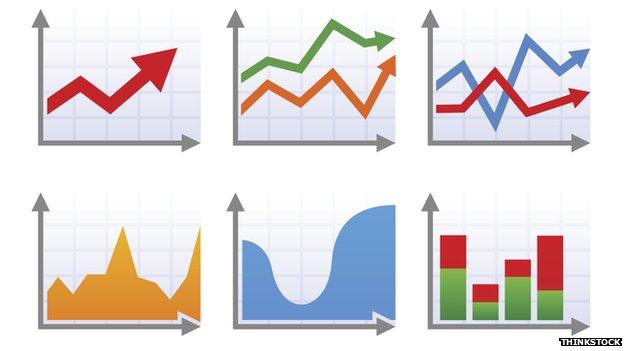
How is the world economy doing? That's the question policymakers are asking as they travel to the annual spring meetings of the International Monetary Fund (IMF) and the World Bank in Washington this week.
Two of the big themes will be those that have dominated much of the macroeconomic debate in recent years: the apparent slowdown in economic growth and the rise in inequality.
The slowdown in growth and the associated low level of interest rates are perhaps the most controversial and most widely debated issue in macroeconomics at the moment. The high-profile question at stake is whether the major economies are suffering from a form of "secular stagnation" (a longer term slowing in growth) or if this is the result of "global imbalances"?
Inequality has been rising up the agenda for years. IMF managing director Christine Lagarde made it the subject of her annual address to the World Economic Forum in Davos last January and Thomas Piketty's Capital in the Twenty-First Century was the unlikely bestseller of 2014.
But a new note out from asset management firm Columbia Threadneedle Investment's Toby Nangle, external questions whether this debate is misplaced.
As he points out, the dual focus on slowing growth and rising inequality is a result of focusing on the Western or advanced economies rather than the global economy as a whole.
Taken as a whole, the global economy has not slowed in recent years, it has accelerated. Global growth since 2000 has been stronger than in the two decades before. The broad pattern has been slowing growth in the advanced economies matched by quickening growth in the emerging ones and crucially the overall proportion of the world economy accounted for by those faster grower emerging economies has risen.
A similar story can be told about inequality. While over the last 35 years inequality has risen in the developed West, the same picture is not visible if one zooms out to look at the Earth as a whole.
Pointing to work by economist Branko Milanovic, external, Nangle notes four trends in global income distribution from 1988 to 2008:
The big winners of those two decades were, in global terms, the middle earners - a group largely accounted for by workers in China
The very top of the global income distribution (the Western rich) have done almost, but not quite as well
At the very bottom of the global scale, there have been people untouched by globalisation, stuck in absolute poverty
And crucially, as Nangle puts it: "There is a large section of people who are well-off in global terms, but who have not participated in global growth over the past 20 years. That section is populated largely by the Western lower middle and working classes"
In other words, the global picture on inequality is much more nuanced.
Nangle has a story to explain these developments which is not to do with "secular stagnation" but simply about globalisation, labour supply and, importantly, power.
The closer integration of the world economy over the last 35 years, the opening of China beginning in the late 1970s, the collapse of Soviet communism and the rise in global trade have all boosted the supply of global labour.
Faced with an increased supply of global labour - what Nangle terms a "rolling avalanche" of increased workers - the bargaining position of labour in the West has fallen. The driver at work here is not immigration but ability of firms to outsource production abroad.
The result is that firms, faced with cheaper global labour have chosen to make more use of that new supply and less use of capital in producing their output. And less demand for capital investment has been associated with a fall in the price of capital, or interest rates.
Nangle further notes that this process of a rising supply of global labour, which has encouraged firms to substitute cheap labour for capital and lowered interest rates, has been the major driver of asset returns over the last few decades. (Lower interest rates raise the value of money due in the future and so raise the current price of assets, such as stocks, that promise a flow of cash in years to come.)
This is a story which recognises that the world we currently live in was built not only by Margaret Thatcher and Ronald Reagan but by Mikhail Gorbachev and Deng Xiaoping.
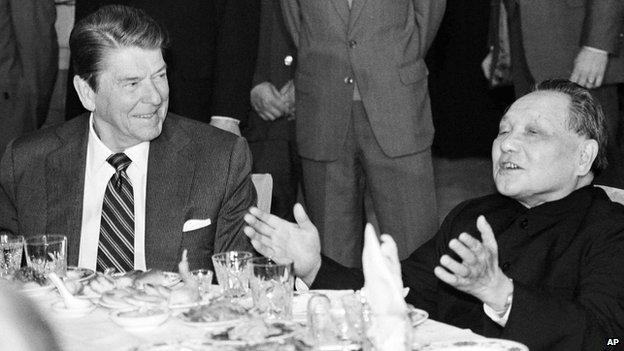
Ronald Reagan and Deng Xiaoping eating lunch together in Peking in 1984
But will the next 35 years look like the past 35 years?
There are reasons to think it might not.
As Nangle notes, the IMF believes China could be subject to labour shortages in five years' time. In other words, the global abundance of cheap labour could come to an end and with it, the trends of the last three decades.
As I've noted before, there are already signs that the pace of globalisation - as measured by world trade growth - is starting to ebb. That too would have consequences for labour supply.
Of course it may be that the weakness of Western wage growth has other drivers. It could be that technological change is just as important. So even if the supply of human labour slows, the pace of robotic labour (broadly defined) may take its place.
It's also important to note that while global forces may have played a huge role in the patterns of individual economies' income distributions over the past few decades, political choices have mattered too. When faced with global headwinds and tailwinds, national policymakers still have some influence - even if it is not quite as much as they often suggest.
But if things do begin to change, what would be the consequences? One bright side could be an increase in Western productivity - which has been extremely poor in the UK since 2008 and broadly weak across the advanced economies. If firms can no longer rely on cheaper labour to boost output and profits, they will have to focus on increasing investment in capital and productivity.
This would be a world in which Western wage growth was stronger and interest rates higher. The outlook for asset prices would not necessarily be a repeat of the three-decade post-1980 boom.
- Published15 April 2015
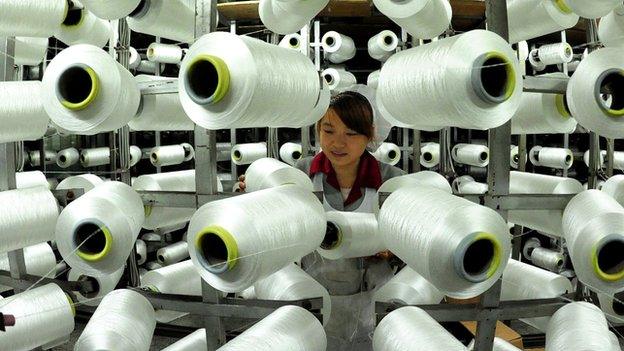
- Published15 April 2015
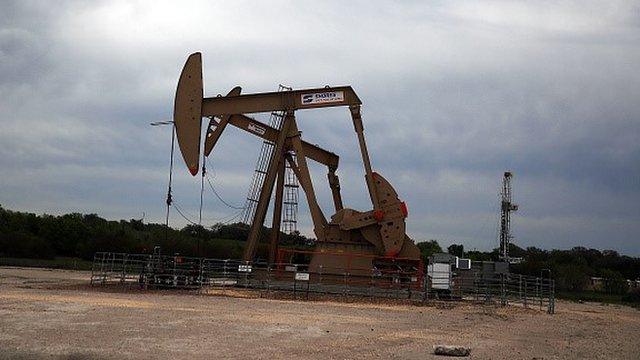
- Published14 April 2015
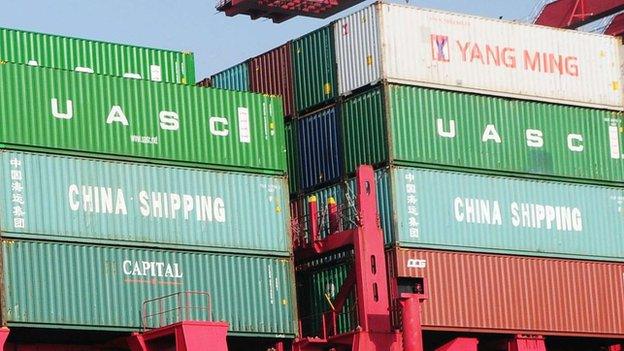
- Published14 April 2015